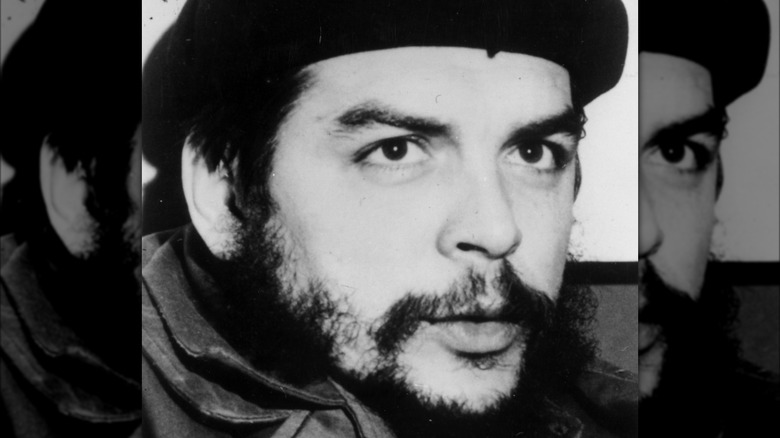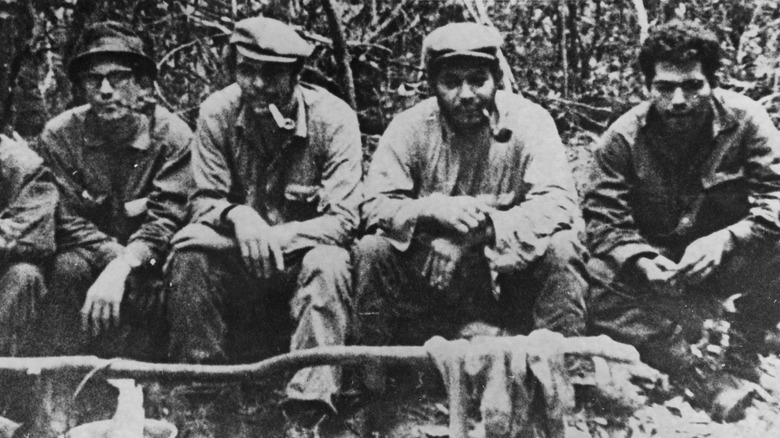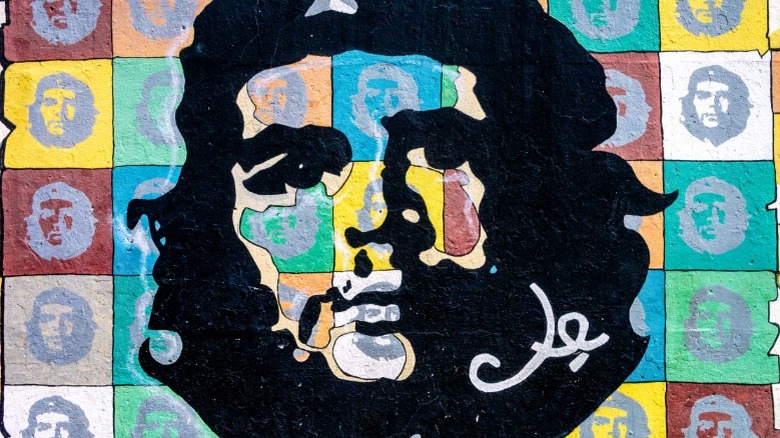How The Cuban Government Helped The Man Who Killed Che Guevara
The man whose face would become one of the most iconic symbols of anti-imperialism and leftist political movements was born Ernesto Guevara de la Serna in 1928 (per Britannica). Known later as Che Guevara, this child of middle-class Spanish-Irish parents would be accepted into medical school, paying the way for what could have been a cush future as a professional in Latin America.
Biographers contend that Guevara's view on the world changed during an extended motorcycle trip he embarked on with a friend throughout some of the poorest parts of South America. This later prompted him to move to Nicaragua to support a leftist by the name of Jacobo Arbenz to install a progressive government there. When this effort was squashed by a coup that the CIA funded, Guevara developed a narrow view of the United States government and its policies of imperialism and colonialism in Latin America. For the next 15 years of his life, Guevara dedicated himself to Marxism and fought to bring these ideals to the working people who he felt it would benefit.
Guevara met Fidel and Raul Castro in the late 1950s. The three became acquainted in Mexico, where the Castros were living in exile. Guevara was brought into Castro's company as a physician, but would also prove his worth in other ways. When Castro and company traveled to Cuba to build a guerilla army to overthrow Batista, Guevara would be elevated to one of Fidel Castro's close allies. On some occasions, Guevara would assume the role of executioner when the band of rebels rooted out traitors or deserters.
Guevara renounces his Cuban citizenship
After rebel forces successfully ousted Batista on January 1, 1959, Fidel Castro was installed as Cuba's new leader. As officials in the U.S. feared, the new regime seized property and assets owned by the U.S. in Cuba (per History). The new government was revealed to the rest of the West to be Marxist, stoking fears and tensions held by Americans in the early stages of the Cold War between them and the Soviet Union. After the new Cuban government became more aligned with the Soviet Union, Guevara grew disenchanted with the new nation he helped fight for.
He began to channel his efforts elsewhere, desiring to help revolts against imperialism in the Democratic Republic of the Congo. While participating in this failed attempt, Guevara renounced his Cuban citizenship (via Britannica). But his time in Africa was short-lived. A year later, Guevara migrated to Bolivia to help lead a band of guerillas against the government.
It was in Bolivia that the revolutionary met his end after being wounded in battle and captured in 1967. On October 9th, The Guardian reports that the Bolivian army ordered sergeant Mario Teran to serve as Guevara's executioner. He shot and killed the leftist icon, but would later benefit from both Guevara's ideology and the country that the revolutionary once called home.
Cuba's socialized medicine saved Teran's eyesight
Fast forward 40 years. Time had not been kind to Teran's eyes, as cataracts had cost him much of his sight. But in 2006, Teran was able to take advantage of a social program named Operation Miracle. The Guardian reports that the program is financed by money captured from the petroleum industry in Venezuela, but staffed by medical professionals from Cuba. Socialized medicine has long been part of the platforms of many leftists, so it could be viewed as a bit of irony that the man who executed one of the most well-known leftist revolutionaries of the 20th century would get medical benefits from a country that he fought a revolution for.
The news of the successful surgery was made public when Teran's son wrote a letter of thanks, which was published in a Bolivian newspaper. A year later, the Cuban government made a public announcement of the surgery on the eve of Guevara's execution.
The official state newspaper of Cuba, Granma, summed up the irony in this way: "Four decades after Mario Teran attempted to destroy a dream and an idea, Che returns to win yet another battle. Now an old man, he [Teran] can once again appreciate the colors of the sky and the forest, enjoy the smiles of his grandchildren and watch football games."


